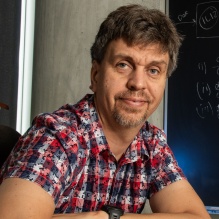Oleg Igoshin
Professor
Rice University
Bioengineering, Biosciences, and Chemistry
Making cell-fate-decisions: lessons from B. subtilis
Abstract
Successful execution of differentiation programs requires cells to assess multitudes of internal and external cues and respond with appropriate gene expression programs. I will describe theoretical predictions and their experimental tests to uncover how, in sporulation and biofilm formation, bacteria can detect starvation stress without detecting any specific metabolites. Calls achieve that by making their networks sensitive to the growth rate and associated changes in gene dosage of key genes. The arrangement of network genes on the chromosome and transcriptional feedback loops allows the coordination of cell-fate decisions with DNA replication. Furthermore, to assess the starvation conditions without sensing specific metabolites, cells respond to changes in their growth rates with increased activity of the cell-fate master regulator. These design features of the differentiation network enable cells to robustly decide between vegetative growth, biofilm matrix production, and sporulation.
Bio
Oleg Igoshin is a Professor of Bioengineering, Biosciences, and Chemistry at Rice University. He has been serving as an Associate chair of bioengineering since 2018. Igoshin joined Rice in 2007 following a postdoc at UC Davis and a PhD at UC Berkeley. From 2012 to present, he has been instrumental in establishing and growing the doctoral program in Systems, Synthetic, and Physical Biology (SSPB). He has also a senior investigator with Rice’s Center for Theoretical Biological Physics since 2013. Research in Igoshin’s Cellular Systems Dynamics Laboratory uses methods of nonlinear dynamics, biophysics, statistics and bioinformatics to expose emergent properties of biological systems on intercellular and intracellular scales. The group specializes in computational systems biology with emphasis on dynamical properties and evolutionary design principles of biochemical networks, pattern formation in bacterial biofilms, thermodynamics and kinetics of non-equilibrium information processing, and pharmacokinetics/pharmacodynamics of biologics. These computational and theoretical methods complement the experimental approaches of collaborators with leading academic and medical researchers across the U.S. and internationally.
Wednesday
April 16, 2025

Oleg Igoshin
Professor
Bioengineering, Biosciences, and Chemistry
Rice University
- Time: 11:00 AM
- Location: 206 Furnas Hall